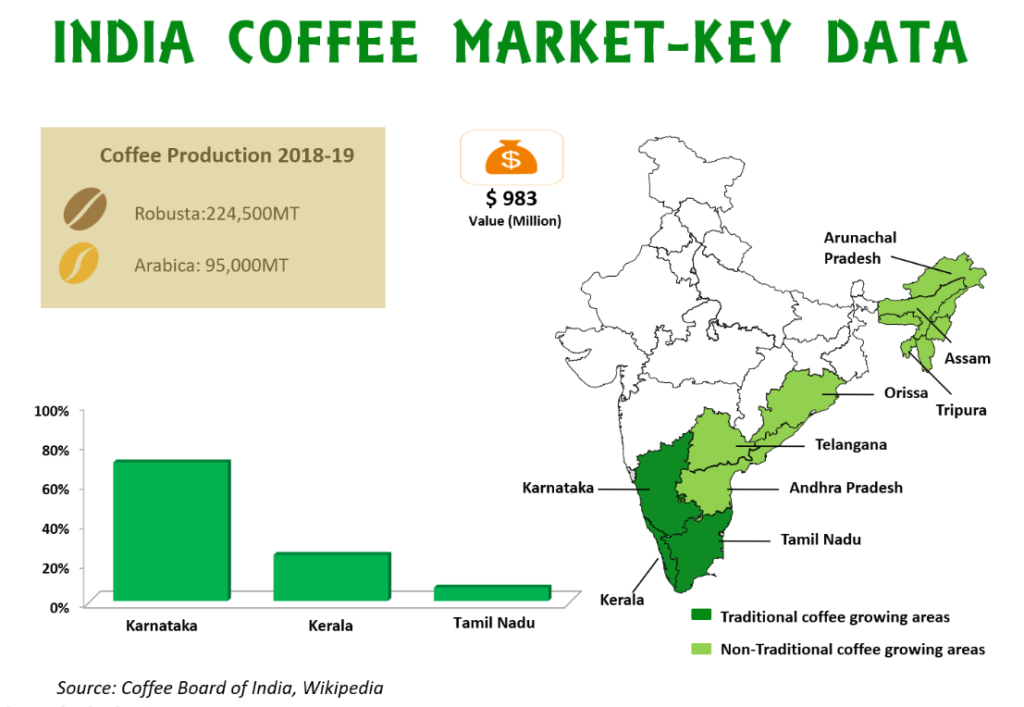Agriculture
India’s Coffee
- 30 May 2023
- 7 min read
For Prelims: Coffee Board of India, Chicory, Coffee production in India
For Mains: Government Policies and Interventions, the significance of coffee plantations in ecologically sensitive regions, coffee consumption and its role in protecting against oxidative damage.
Why in News?
Recently, the Statista site stated that India is the sixth largest producer of coffee in the world, after Brazil (largest producer of coffee), Vietnam, Colombia, Indonesia, Ethiopia and Honduras.
- In recent times, there has been increasing attention on the health benefits of South Indian coffee blend, particularly highlighting the role of chicory and coffee with milk.
What is South Indian Coffee Blend?
- About:
- It Includes an admixture of coffee and chicory powders.
- Gives the blend a unique flavor and characteristics.
- Chicory:
- Herb native to Europe and Asia.
- Contains inulin, a starchy substance beneficial for health which is found in a wide variety of fruits, vegetables, and herbs, including wheat, onions, bananas, leeks, artichokes, and asparagus.
- Possesses mild laxative properties and it decreases swelling and is rich in beta-carotene, providing superior protection against oxidative damage.
- Absence of caffeine in chicory makes it a suitable complement to coffee, which contains caffeine.
What are the Health Benefits of Coffee?
- Health Benefits of Coffee:
- Protection against oxidative damage.
- Reduced risk of type 2 diabetes.
- Reduced risk of age-related diseases.
- Coffee with Milk and Potential Health Effects:
- While plain coffee is popular in many parts of the world, South Indian filter coffee is typically served with hot milk.
- The addition of milk enhances the taste and flavor of coffee.
- Research from the University of Copenhagen suggests that coffee with milk may have an anti-inflammatory effect, aided by the combination of proteins and antioxidants present in milk.
- A large-scale human trial is underway to study the health effects of milk-added coffee, sparking interest among Indian coffee lovers.
What are the Key Points about Coffee?
- History and Commercialization:
- Coffee was introduced to India during the late seventeenth century.
- The smuggling of seven coffee beans from Yemen to India by an Indian pilgrim in 1670 marked its initial arrival.
- The Dutch, who occupied parts of India during the 17th century, played a role in spreading coffee cultivation.
- However, it was during the British Raj in the mid-nineteenth century that commercial coffee farming fully flourished, particularly from the Mysore region.
- Cultivation and Biodiversity:
- Coffee Plantation Practices in India:
- Predominantly grown under thick natural shade.
- Ecologically sensitive regions of the Western and Eastern Ghats.
- Biodiversity Hotspots:
- Coffee plantations located in these regions are recognized as biodiversity hotspots.
- Contribute significantly to India's unique biodiversity.
- Export and Domestic Consumption:
- Approximately 65% to 70% of the coffee produced in India is exported and remaining coffee is consumed domestically.
- Role in Sustainability and Socio-economic Development:
- Coffee cultivation plays a vital role in sustaining biodiversity.
- Fosters socio-economic development in remote hilly areas.
- Coffee Plantation Practices in India:
- Climatic Conditions and Soil Types:
- Climate Conditions:
- Hot and humid climate, Temperature 15°C to 28°C, and Rainfall 150 to 250 cm.
- Harmful Conditions:
- Frost, Snowfall, High temperatures above 30°C, and Strong sunlight.
- Ideal Soil Conditions:
- Well-drained loamy soils, Presence of humus and minerals (iron, calcium), Fertile volcanic red earth, and Deep sandy loam soils.
- Less Suitable Soil Conditions:
- Heavy clay soils, Sandy soils.
- Climate Conditions:
- Geographical Distribution and Varieties:
- Coffee Plantation Locations in India:
- Karnataka, Kerala, Tamil Nadu, Andhra Pradesh (Araku Valley), Odisha, Manipur, Mizoram, and Other northeastern states.
- Major Coffee Producer:
- Karnataka accounts for approximately 70% of India's total coffee production.
- Coffee Varieties in India:
- Arabica and Robusta.
- Characteristics of Arabica:
- Grown at higher altitudes and it has Higher market value due to its aroma.
- Characteristics of Robusta:
- Known for its strength and used in various blends.
- Characteristics of Arabica:
- Arabica and Robusta.
- Coffee Plantation Locations in India:
The Coffee Board of India
- It is a statutory organization that was constituted under Section (4) of the Coffee Act, 1942.
- It functions under the administrative control of the Ministry of Commerce and Industry, Government of India.
- The Board comprises 33 Members including the Chairperson, who is the Chief Executive and it functions from Bangalore.
- The Board mainly focuses its activities in the areas of research, extension, development, market intelligence, external & internal promotion for coffee.
UPSC Civil Services Examination Previous Year Question (PYQ)
Prelims
Q. 1 Match List-I with List-II and select the correct answer using the code given below the Lists: (2008)
| List-I (Board) | List-II (Headquarters) |
| A. Coffee Board | 1. Bengaluru |
| B. Rubber Board | 2. Guntur |
| C. Tea Board | 3. Kottayam |
| D. Tobacco Board | 4. Kolkata |
Code: A B C D
(a) 2 4 3 1
(b) 1 3 4 2
(c) 2 3 4 1
(d) 1 4 3 2
Ans: (b)
Q.2 Though coffee and tea both are cultivated on hill slopes, there is some difference between them regarding their cultivation. In this context, consider the following statements: (2010)
1. Coffee plant requires a hot and humid climate of tropical areas whereas tea can be cultivated in both tropical and subtropical areas.
2. Coffee is propagated by seeds but tea is propagated by stem cuttings only.
Which of the statements given above is/are correct?
(a) 1 only
(b) 2 only
(c) Both 1 and 2
(d) Neither 1 nor 2
Ans: (a)







